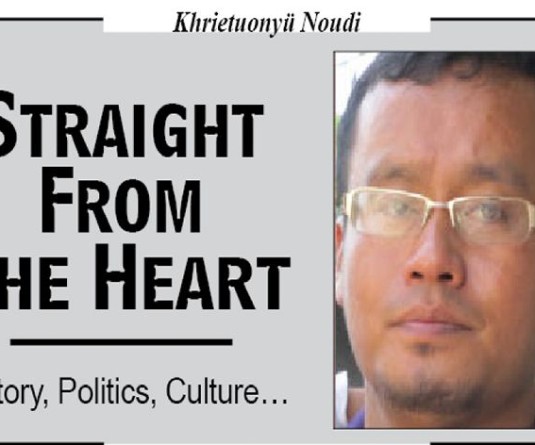
Dr Eyingbeni Hümtsoe-Nienu
Introduction: In the ongoing discussion relating to quota for women in ULB’s, we see how writers in both print and online media continue to bring Christianity into the debate. Interestingly, more often than not, the Bible is used as a tool to strengthen the argument in favor of perpetuating patriarchal privileges endowed on Naga men from “time immemorial”. Whenever that happens, the Bible – the primary authoritative source of Christian faith – becomes a casualty and the “Christian God” sadly is misrepresented. Herein, I would like to give a biblical and theological reflection against common misconceptions among many Naga Christians concerning women’s status and role.
Women and Men are Equal in Being: A cursory reading of the Bible confirms that all human, women and men, are created in the image of God: “God created humankind in his image, in the image of God, he created them; male and female he created them” (Gen 1: 27). This substantive equality is affirmed in Adam’s remark on seeing Eve, “This at last is bone of my bones and flesh of my flesh” (Gen 2: 23). The moment that God created humanity, comprising both female and male, he deemed them equally “very good” (Gen 1: 31). God never intended for gender hierarchy in the first place. The essential (e)quality with which both sexes (sex and gender are used interchangeably) were created, in God’s image no less, challenges any human cultural construct that claims the superiority of men to women. The NT further establishes that women and men are complementary equals as co-creators of each other in partnership with God, their common origin. Apostle Paul is quite straightforward in this matter and duly presented the theological truth: “(Nevertheless), in the Lord woman is not independent of man or man independent of woman. For just as woman came from man, so man comes through woman; but all things come from God” (1Cor 11: 11-12).
Society has consistently favored the male. Patriarchal ethos that regards boys and men as means for perpetuating genealogy is to miss the indisputable truth that without women there will be no offspring to talk about in the first place. The traditional Naga community in general attributed worth to women only in so far as they procreate male/s. Else, it was deemed a valid ground for divorce. Very few modern families make no distinction between sons and daughters and extend that positive Christian attitude towards people of both genders beyond the home. In Christianity, this equal valuation of the genders is intrinsic to their being human. It is not conditioned by any external identities. God has ordained for both sexes to be created in his image with equal substance, value and dignity. To deny this is to deny the biblical affirmation that women are created in the image of God.
Women and Men are Equal in Status and Responsibility: The purpose of creating humanity, both female and male, is basically divine in nature (Gen 1: 26). After being created, both the male and female were given five blessing: to be fruitful, to multiply, to fill the earth, to subdue it, and to have stewardship over every living creature (v. 28-30). These blessings came with responsibility. God assigns equal responsibility to both sexes and thus confirms their equal status and role. Women were never divinely assigned comparatively inferior task or minimal task. Naga historical reality, including decapitating warfare, which have structured gender roles and consequently determined a lopsided gender status must not find relevance among a people who now claim to be disciples of Christ or Christians. Apostle Paul clearly teaches, “In Christ there is no longer…male and female; for you are all one in Christ Jesus” (Gal 3: 28).
To be guided by a mentality that presumes male prerogative in areas that pertains to the public, rational, and leadership at the expense of permanently relegating the female to the sphere of the domestic, emotional and collaborator contradicts divine values of gender justice espoused by God in the Bible and exemplified by Jesus Christ and continually meant to be actualized by his followers. The responsibilities enshrined in the values are meant for mutual upbuilding (Rom 14: 17-19). They are not intended to ignite gender wars or to set one gender above the other. Attempts to repress one gender in order to nurture sexist ideology of supremacy, domination and control, under the guise of customs and traditions, is a sin because it breeds negative consequences on humanity and thus falls short of the design, glory and character of God.
Women and Men are Equal in Sin: The fact of the universality of sin equalizes the gender in the most profound way. The degree of guilt too is equal. Paul points out that “all have sinned” (Rom 3: 23) and John concludes that we are liars if we claim to be sinless (1Jn 1: 8). The tendency of the Church and Christians in general to regard womankind as each an Eve, the mother of sin, is a serious theological flaw. The justice of God ensures that after the fall, all guilty parties were equally held accountable. Eve, Adam and the serpent were judged for their sin of mistrust, disobedience, and falsehood (Gen 3). It appears to be easy to put the blame on Eve and her gender as solely responsible for the “original” sin and to despise them for it. But the condition of sinfulness that paves way for evil deeds is an innate human birth condition (Gen 6: 5; Ps 14: 3, 51: 5; Rom 1: 18-22). It is a reality of being human – women or men; for only God can be without sin (2Cor 5: 21; 1Jn 3: 5; 1Pet 1: 18-19, Heb 4: 15).
Naga Christians are put to the task in challenging some of the erroneously held belief that dismiss women as potentially more sinful than men; thus deprived of sacramental duties in the church by way of denying pastoral office and ordination. Such repressive ideas are further solidified by extant traditions that believe women to be impure and inauspicious; thus forbidden to touch war implements and excluded from hunting and fishing expeditions. Such prejudices against women contribute to their marginalization in both religious and secular opportunities, particularly in leadership. Social inequalities resulting in discrimination and oppression are symptoms of inward human sinfulness. Tragically, human can become immune to sin, especially when it is embedded in cultural norms. But it can be detected and overcome – in the physical, spiritual, and social sense – through the Holy Spirit who enables Christians to bear fruit befitting the reign of God (Gal 5: 16-26).
Women and Men are Equal in Re-creation: Embracing Christianity for 145 years must mean much for Naga women and men who are no longer under the curse: “he (husband) shall rule over you” (Gen 3: 16; Eph 2: 1). In the new dispensation, Jesus Christ, through his grace as a gift, rearranges the order of things, including human relations. The extent of redemption is inclusive and involves a renewal of nature and by extension of systems. Paul clearly writes, “So if anyone is in Christ, there is a new creation; everything old has passed away; see, everything has become new!” (2Cor 5: 17). The reality of God’s re-creation in and through Jesus Christ finds personal and social significance in Jesus’ idea of relationship and leadership. He categorically says, “Whoever wishes to become great among you must be your servant, and whoever wishes to be first among you must be slave of all. For the Son came not to be served but to serve, and to give his life a ransom for many” (Mk 10: 43-45). Thus the relationship between the ruler (man) and the ruled (woman) are drastically changed into partnership in humility.
The traditional Naga worldview images women obeying men as a pinnacle of machismo. Reversing the image is evidently not accepted with grace. Recent incidents in the State have proved that. Then what has changed for the Naga Christians in relation to our nature as men and women – a product of our culture? What has changed in our social ordering in accordance with the Jesus’ principle of reciprocal service – also between genders? How has Christianity affected change in our customary practices in terms of gender reconciliation that replaces “old” male chauvinism with “new” attitude towards women that view them as divinely enabled partners in all aspects of life? It is disheartening to realize that the redemptive work of Christ has only slightly touched the surface – or maybe only has affect on official documents. An inner regeneration is far from evident in both individual and community levels. This is especially true in the way corporate bodies view and (mis)treat its women. Many Naga Christians and church leaders have misinterpreted Bible text like Eph 5: 22-23, “Wives, be subject to your husbands as you are to the Lord. For the husband is the head of the wife…” and 1Tim 2: 11-12, “Let a woman learn in silence with full submission. I permit no woman to teach or to have authority over man; she is to keep silent” and used these texts to support male dominance and women’s subordination. An in-depth study (every literate person is capable) shows that Paul was actually challenging the roles that interpreters defend. Suffice it to say that in the first text, the implication is for husbands (not men in general) to love and serve their wives (not women in general) and wives to be supportive of and serve their husbands. The key point the Paul indicates in marriage relationship is “mutual regard and service” just as Jesus taught and exemplified. In the second text, Paul transcends Greek and Jewish cultural restriction in educating women beyond domestic science. Introduced to a new privilege of learning, Paul instructs Christian women to willingly meditate in quietness, without being rude or domineering (John T Bristow, 1988:72). Modesty in the church was the chief concern of Paul, clearly not the silencing of women. Not to live up to biblical standards is a serious shortcoming but to pretend to be speaking on behalf of God to suit one’s sexist cultural leanings is hypocrisy; both clearly not signs of being re-created in Christ.
Conclusion: The Bible claims that “God shows no partiality” (Rom 2: 11). It is against God’s nature to treat one of his image bearers with less value than the other. Throughout human history, local cultures have tended to be prejudiced against women. The Jewish culture is not an exception. However, the God of the Bible has always worked contrary to cultural norms. Hence, women are also mother of nations (Sarah, Hagar, Leah, Rachel), Activists (Shiprah, Puah, Jechobed, Esther), warrior (Deborah, Jael), prophets (Miriam, Deborah, Huldah), heirs (Zelophehad’s and Job’s daughters). The NT is rife with instances where Jesus and the male apostles surmounted cultural barriers to put women in their divinely ordained place of equality with men. Jesus heals women with stigmatized physiological conditions, teaches them divine knowledge, and makes them disciples and apostles. In the early church, women rendered service in all areas of ministry as prophets, deacons, preachers, and sponsors (Acts 11: 27, 16: 11-15; 17: 34; Phil 4: 2-3; Rom 16: 1-4). The Bible in its essence reveals God, his will and his deeds – through various channels. Our collective claim to be a Christian majority state would be justifiable when our mutual attitudes and our working systems reflect this God and his message. Likewise, amendment of Naga customary practices would be meaningful only if done in the light of biblical tenets that establish and defend gender equality in totality and abundance (Jn 10: 10), in words and in deed.





